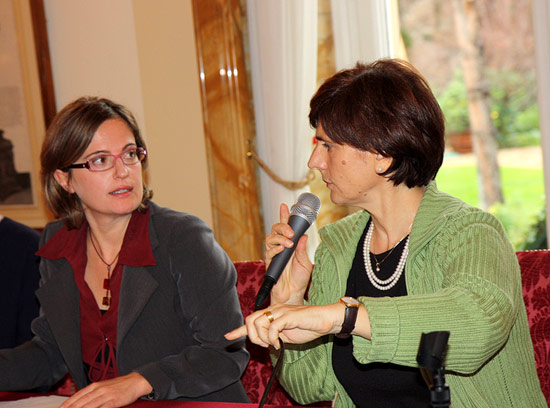Business Culture: Women in Business
In Italy, wealth is often a chief determinant of social class. University education and the ability to speak in the country's standard dialect are typical indicators of higher status. A person’s rank is also influenced by the region of the country he or she comes from, with the North seen as the bastion of the social elite. Within this hierarchy, men are heavily favored. Yet despite being considered a patriarchal culture, Italy definitely has a matriarchal backbone. A popular Italian saying is that man is the “head” of the family, while woman is its “soul”. However, it is often the woman who is the key decision maker within the family, even when she is cast in the stereotypical roles of wife, mother, and domestic worker. Within the urban centers of Rome and Milan, women are challenging this perception, but the stereotype remains strong in rural areas. In the business world, you will generally be free to act in pursuit of your goals without encountering much in the way of gender-related discrimination.
Public Presence
Italian women enjoy freedom of movement, and you will see them mingling and interacting with men in virtually every setting. Notable exceptions include mosques (Rome has the largest one in Western Europe) and Jewish Orthodox synagogues which have separate praying areas for men and women. Sports teams are also typically segregated, especially at the professional level. Additionally, on the Adriatic coast there is one stretch of sand that is designated for women only. In general, however, you will see women sharing the same spaces with men in both public and private settings. Churches, restaurants, museums, post offices, public parks, stores, entertainment venues, and the ubiquitous cafés and gelato shops are all the domain of both genders. Saunas and spas are also normally open to both sexes at the same time. In addition, men and women mingle on public transportation, so you are free to sit anywhere your ticket permits.
You will undoubtedly notice that Italian women practice their freedom of dress. It should come as no surprise in the land of Armani, Versace, and Gucci that the populace is very fashion-conscious. Feel free to bring your jeans if you wish, but most Italian women make sure their jeans have designer labels and fit their bodies snugly. Tops are usually in the latest style, and classy shoes with heels are more common than sneakers, unless a woman is trying for an extremely casual look. Attractive slacks and capris are also worn, but shorts are mainly the attire of tourists. Older women frequently opt for dresses year round, although you will see younger ones wearing stylish summer dresses as they stride along the nicer boulevards during the warmer months. If you decide to head for the beach, you will fit in best with a two-piece swimsuit. This can also come in handy if you decide to visit a spa or sauna, since Italian ones usually don’t require nudity, especially in the more conservative southern areas. In addition, you might want to bring along a scarf or shawl if you choose to wear sleeveless tops, as Italian churches normally require women to cover their shoulders before entering. For business meetings, wear stylish, tailored suits, dresses, or skirts in dark or neutral colors, paired with fashionable blouses, high heels, and understated but high-quality jewelry.
Italian women can move about with the companions of their choice, whether they be men or women, so you will have the freedom to socialize with whom you will while in Italy. You can also travel alone if you wish, but for safety reasons you may wish to travel with at least one other person in some areas of the country.
Personal Interaction
Italians normally stand within an arm’s length of others when speaking to them. Close friends and family members sometimes give kisses on both cheeks starting with the left one, but handshakes are the standard business greeting for both men and women. Your Italian male associates may wait for you to extend your hand first out of courtesy. Make direct eye contact when talking to colleagues of either gender, and speak to both men and women as an equal.
Italian women are considered to be people with their own ideas, opinions, and emotions. However, Italian men do not always place the same value on a woman’s thoughts as they do on a man’s. If you feel that you are being sidelined in a discussion, it may be helpful to have your male colleagues direct the conversation back to you or echo your proposals.
Autonomy and Leadership
Italian women can travel both domestically and internationally, run their own businesses, and own property. However, they are underrepresented in the workforce and the political arena. One of the reasons for this is due to insufficient child care. Many women must choose between being a mother and having a career. There is also a significant wage gap between men and women in Italy. Nevertheless, you should feel free to negotiate, sign contracts, and delegate responsibility to the extent your position requires.
Article written for World Trade Press by John E. Roper.
Copyright © 1993—2024 World Trade Press. All rights reserved.

 Italy
Italy 
